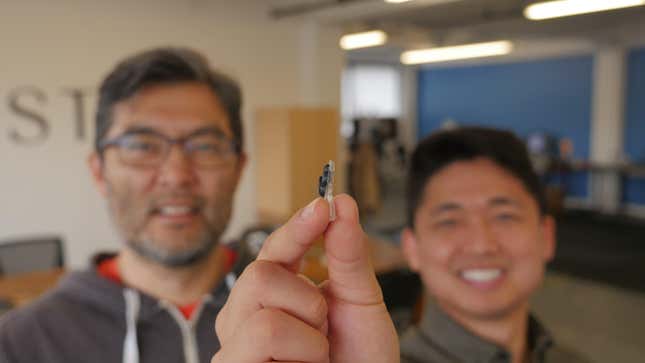
STAT Health announced it has created a device that will monitor the root cause for people suffering from long Covid and POTS (postural orthostatic tachycardia syndrome) symptoms. The device, called STAT, uses blood flow measurements to determine why an individual may be suffering from dizziness, fainting spells, and/or brain fog.
The STAT device is easy to use, fits easily inside the individual’s ear, doesn’t require charging, as it uses solar energy to replenish the battery, and can be worn while sleeping and showering. STAT uses an accelerometer, pressure sensor, temperature sensor, and micro solar power, among others to appropriately monitor the wearer’s blood flow, but a company press release says the purpose of the device is not to prevent the symptoms associated with POTS or long Covid but to find the underlying cause for why they’re occurring. It will track the individual’s response when they stand up focusing on any changes in their heart rate, blood pressure, or blood flow.
The symptoms STAT tracks could be associated with illnesses like POTS, which is triggered by standing up and causes fainting, dizziness, rapid heartbeat, and problems with cognitive functions like thinking, concentration, and memory loss. Meanwhile, long Covid has also been linked to brain dysfunction including brain fog, and heart issues that can cause lightheadedness, dizziness, and vertigo.
The continuation of Covid-related health issues three years after the start of the pandemic has created concern among doctors who are unsure how to treat suffering patients. The problem is, there isn’t a one-size fits all approach to treatment because symptoms vary and can depend on how severe the individual’s illness was when they contracted Covid.
“One of the challenges of treating long Covid is that it presents differently in each patient, so every patient is treated individually,” Benjamin Abramoff, MD, who is an assistant professor of Physical Medicine and Rehabilitation in the Perelman School of Medicine at the University of Pennsylvania, told Penn Medicine News. “So we focus on treating symptoms and working to improve day-to-day quality of life and function.”
A survey from the Kaiser Family Foundation revealed that as of January of this year, roughly 28% of people still suffer from long Covid, and while that number is decreasing, the fact that the reasoning is still unknown makes the STAT device an important tool to diagnosing the underlying causes. “This population, a lot of doctors actually can’t measure that anything is necessarily wrong with them,” Daniel Lee, the co-founder and CEO of STAT Health told CNBC. “They’re told it’s just in their head because there’s not a way to measure it. But there is a way to validate that there’s something wrong and their experiences are legit.”
STAT was tested by Johns Hopkins University which found that the device went one step further than monitoring blood flow by detecting fainting episodes before they had happened, the STAT Health website reported. “After multiple engineering breakthroughs, we’ve succeeded in unlocking the ear to combine the convenience and long-term nature of wearables with the high fidelity nature of obtrusive clinical monitors,” Lee said in a press release. “No other device comes close along the axes of wearability and cardiac signal quality, which is why we believe STAT is truly the world’s most advanced wearable.”
Those who want to purchase the STAT device are able to put their name down on the STAT Health website starting Tuesday, a $1 deposit gets you a spot in line for when it’s eventually released.
The company said on its site that it will officially take pre-orders in Fall 2023 and confirmed STAT will be a subscription service, currently aiming to charge $50 a month, but is subject to change and may decrease over time for long-term users. STAT Health says the pricing will be finalized when the device becomes available for pre-order.